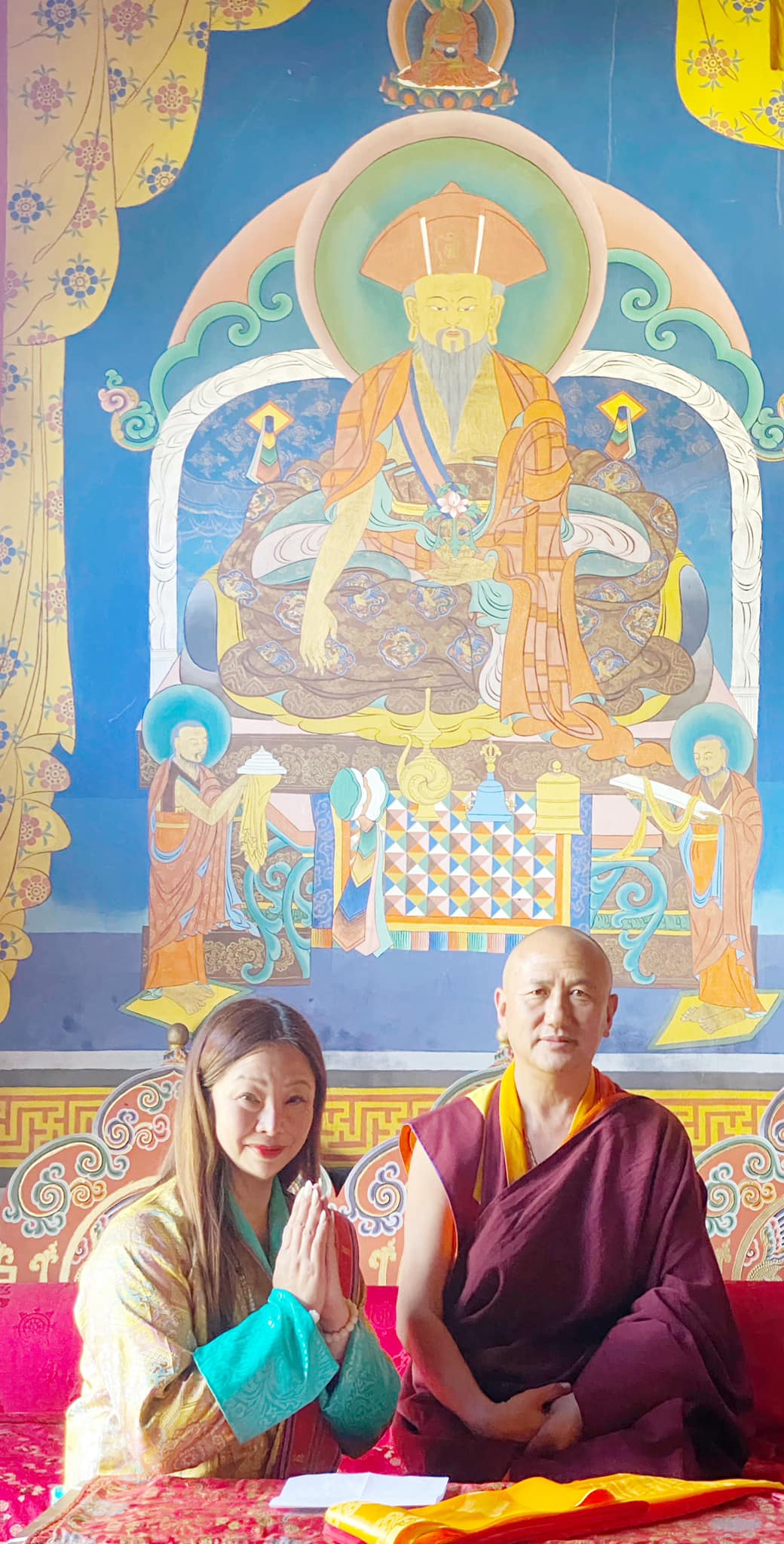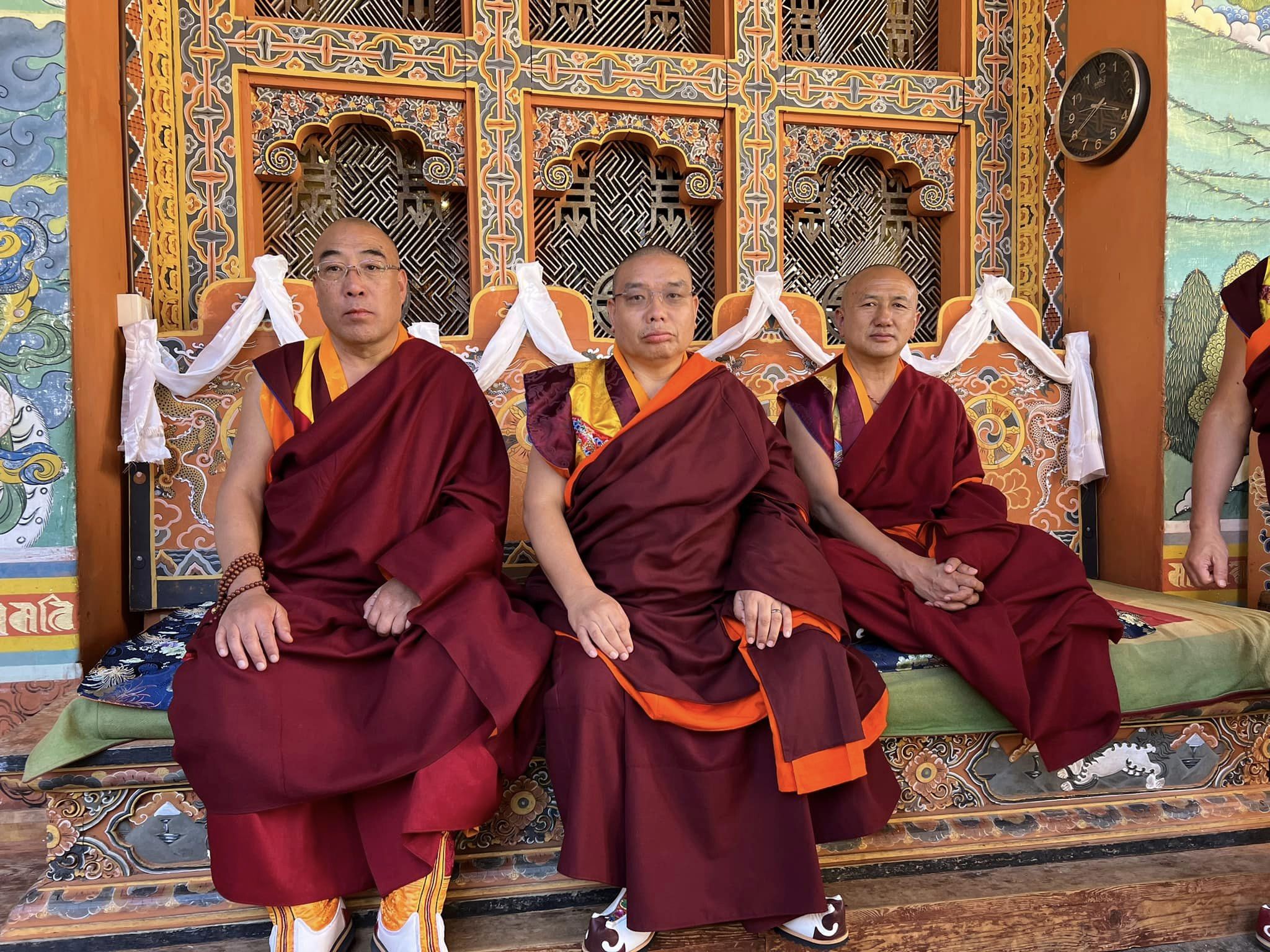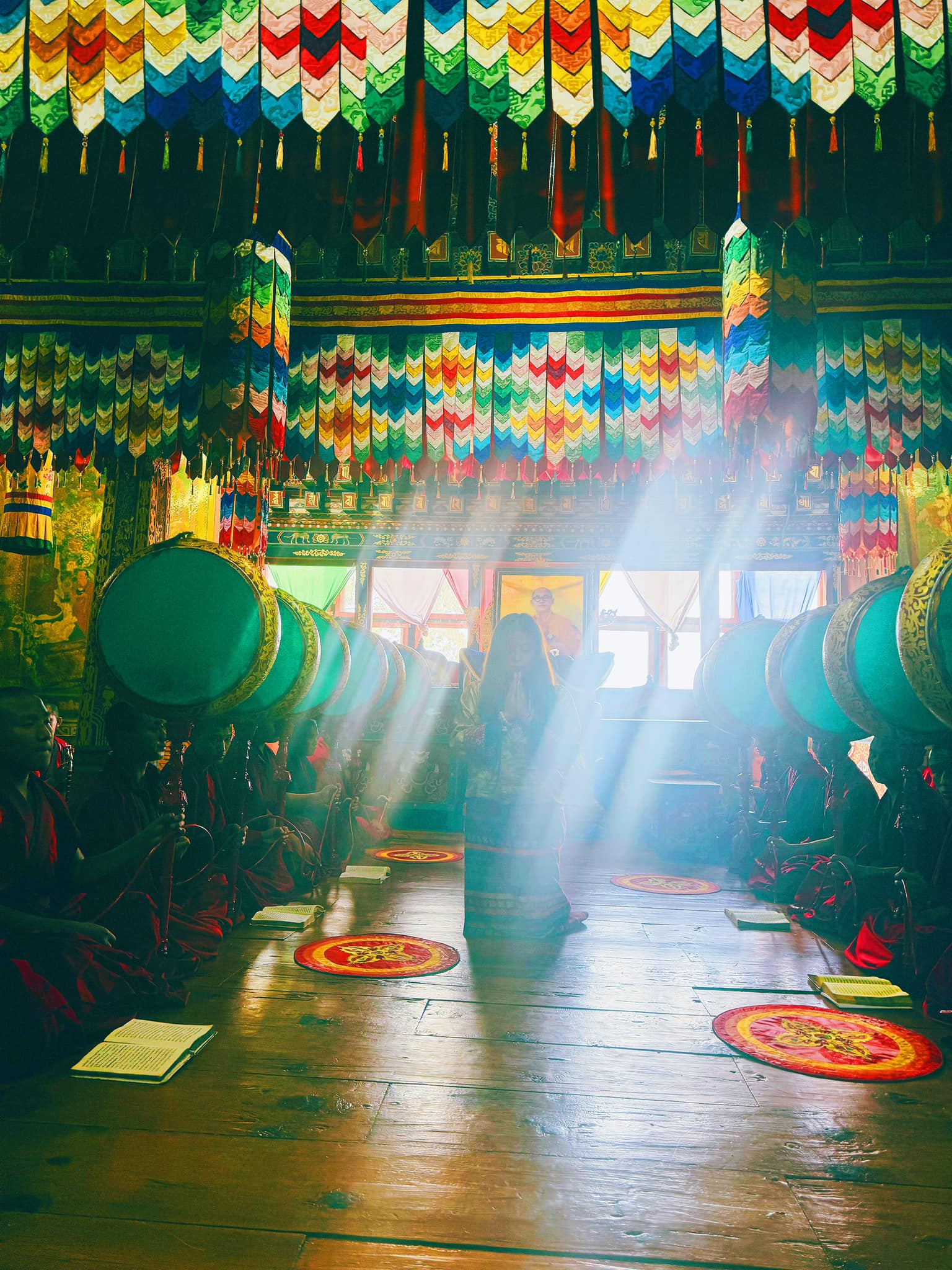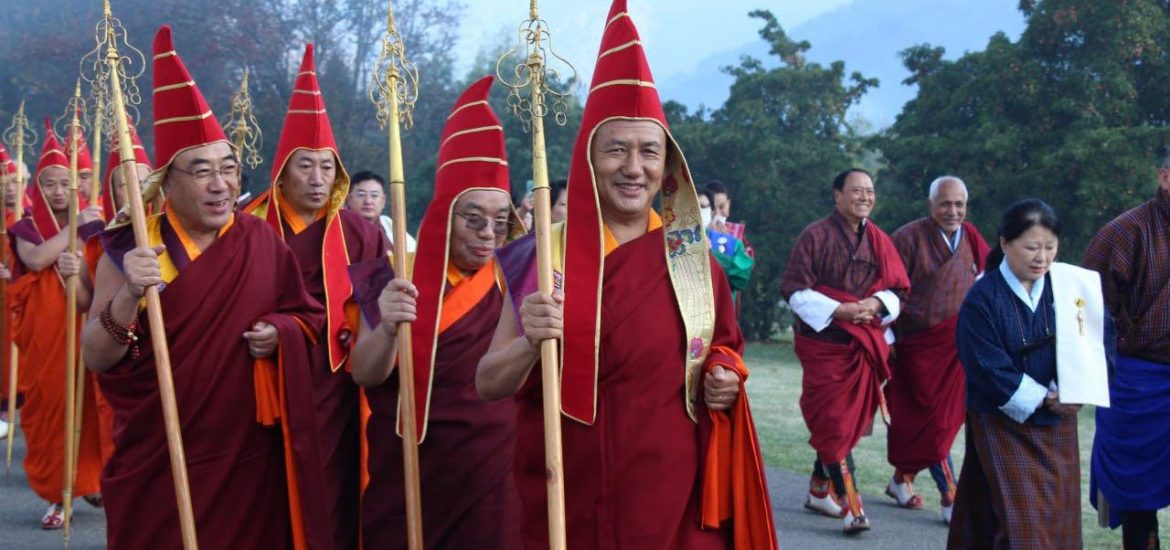Vajrayana Buddhism has been the consistent religious ideology of Bhutanese politics and culture since the country’s founding, and remains a fundamental aspect of its contemporary identity. Eminent teacher, His Eminence Leytsog Lopon Sangay Dorji, is also the most senior master among the five top officials (lopon) of Bhutan’s central ecclesiastic body since 1621, the Zhung Dratshang. A monk since the age of 11, he is in charge of all sangha-related activities, including administration and development. He is the chairman of the Dratshang Koedtshog, the Zhung Dratshang’s executive committee.
I had the pleasure to meet the Leytsog Lopon at the scenic Tashichho Dzong, the seat of Druk Desi. There, amid floor-to-ceiling Buddha statues in the state hall (which itself is among 30 temple structures), my master Sangay sat cross-legged, in the lotus position, in the Je Khenpo’s private waiting room. The gravity of the moment felt like the Catholic equivalent of awaiting a meeting with one of the Pope’s closest cardinals. Behind him was a 12-foot mural ablaze with primary colors, depicting the “Unifier of Bhutan,” Shabdrung Ngawang Namgyal.
After exchanging formalities, and two tea ceremonies later, Sangay suggested we meet in one hour at one of the oldest temples in Thimphu, Changangkha Lhakhang, which was founded in the 13th century. When I arrived, I was amazed by shelf upon shelf of prajnaparamita sutras. At the center was a beautiful Chenrezig statue on an altar. I sat under an old thangka whilst Master gave me an oral transmission of wisdom. Then he presented me with four sacred relics: a vajra, a bone, a wand, and a statue. Each of them he said were from various well-known gurus, including Padmasambhava. I bowed and he tapped my head repeatedly, reciting a mantra of grand blessings. As we finished, the main door opened. To my surprised delight, there was a long queue of local women and children waiting for their turn to be blessed, all kneeling and covering their mouths in the utmost respect.
We eventually made our way to his ancestral home and after a vegetarian dinner, we were able to converse more intimately so he could dispense some wisdom to me. I rejoiced in this blessed moment for the whole night. While I returned home from Bhutan shortly after meeting him, I look forward to learning more from His Eminence as time goes on.

Buddhistdoor Global (BDG): Can you elucidate the distinction between the key to happiness for self and that for the country?
Sangay Dorji (SD): The key to happiness of the nation is a pure mind and right motivation. If 70 out of 100 citizens are very patriotic, well-disciplined, with pure mind and right motivation, the nation will naturally prosper in peace and happiness. Conversely, if 70 of them are very non-patriotic with ill mind, ill thoughts, ill determination, then the nation will experience chaos.
In addition to right motive, we must have selflessness. Kindness and compassionate thoughts in helping others will naturally generate peace and happiness within oneself, family, and society. For example , the key to happiness can be your drawing or calligraphy. So the drawing is a source of calmness, right? Just looking at a very beautiful picture, we generate calm, peace, and happiness.
The second key to happiness is ritual and prayers. In each of the twenty districts we yearly conduct a grand ceremony called Prayer for World Peace. During this practice we invite all the Buddhas and bodhisattvas to offer prayers and feast offerings. Their blessings drive away all obstacles, even the misfortunes. This is the reason how the nation can experience peace, calm, happiness and no disasters. And as an individual, when we offer prayers and ritual, it also generates peace for oneself.
One key factor of being be a practitioner or a teacher is that one should sacrifice one’s happiness for the benefits of others in a selfless manner. If the motivation is right and pure, then it will benefit others.
BDG: Can you explain how the meaning of happiness in Bhutan differs from the Western conception?
SD: The pursuit of peace and happiness can be achieved in two ways. One is from external sources and one is from within. Primary peace and happiness can be obtained by experiencing it within ourselves. It is the essence of peace and happiness, which can only be achieved through a spiritual way of life. External peace and happiness can be obtained by also getting into a spiritual practice, but they are just temporary. They do not last.

BDG: What role do you think Buddhism can play in making Bhutan a more compassionate society?
SD: Many programs are initiated to making Bhutan a more compassionate society by promoting the values of compassion, kindness, and empathy. These values are at the core of the Buddhist teachings and can help people develop a deeper understanding of themselves. By practicing these values, people can learn to be more tolerant, patient, and understanding towards each other. This can lead to a more harmonious, respectful and peaceful society. They can meditate and chant OM MANI PADME HUM, which is the essence to generating loving kindness and compassion.
BDG: How can we work to integrate Buddhist values in our daily lives and also for the society?
SD: In the quest for peace and happiness, we must strive to integrate Buddhist values into our daily lives and society. As human beings, we are born into different countries, races, and groups, but we share a common goal: to achieve ultimate happiness and peace. To attain this goal, we must unite and bring our aspirations together through practicing meditation, sharing loving kindness and compassion, and upholding the biggest concepts of ethics and discipline.
The younger generations of the 21st century are the primary targets of our evolving program. They are the influential people of future generations, and therefore, much focus is given to their integration. The program aims to logically interrupt the youth’s thought processes and initiate integrated problem-solving skills that are relevant to the digital age. In this era, where telecommunication and digital technologies are beginning to shape the world, it is essential that we infuse the concepts of ethics and discipline.
In order to integrate the Vajrayana teachings, we need to know the languages of the people we aim to collaborate with. We are thinking of starting a collaborative program in the coming years to spread the teachings worldwide in the Mandarin-speaking nations like Hong Kong, Taiwan, and Mainland China. This will help us to achieve our common goal of peace and happiness.

BDG: Does being a devoted Buddhist make someone a more virtuous citizen?
SD: Yes, a devoted or a spiritual person should have a pure or bodhicitta mind. Everything is controlled by our mind. If a mind is disciplined, and if a mind is altruistic or bodhi-minded, naturally, it will let the body and speech function in a right way, your body will do good for yourself and for the nation.
From your speech, you should speak very soft, a soothing truth. And as a result, when your speech is pure, then naturally you will influence other people in a right and wholesome way. Then you become a productive citizen.
So very devoted people with right motivation, or with a bodhi-mind, can be what I call “rightful citizens.” A devoted person can be called a spiritual person.
BDG: Finally, a personal question: what is your favourite topic to teach in Buddhism ?
SD: Of all the spokes in the Wheel of Dharma’s Noble Eightfold Path, these two are the most primary and my favourites: Right view and Right Thought. This is everything.
Related blog posts from BDG
Stately Refuge and Scented Friendship


